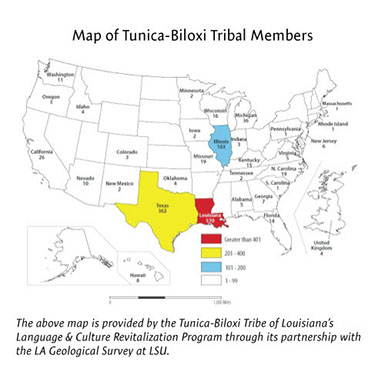 The Tunica-Biloxi Tribe is one of four federally recognized Native American tribes in the state of Louisiana. There are approximately 1,500 enrolled Tunica-Biloxi tribal members interspersed throughout Louisiana, Texas, Illinois, and other parts of the United States. Approximately 42 percent live either on or near the reservation and designated tribal lands located in central Louisiana. The majority of tribal families in Louisiana reside in Avoyelles and Rapides parishes. The second highest concentration of tribal families resides in Texas with the majority of members in Harris and Brazoria County. Illinois has the third highest with the majority living in Cook County.
The Tunica-Biloxi Tribe is one of four federally recognized Native American tribes in the state of Louisiana. There are approximately 1,500 enrolled Tunica-Biloxi tribal members interspersed throughout Louisiana, Texas, Illinois, and other parts of the United States. Approximately 42 percent live either on or near the reservation and designated tribal lands located in central Louisiana. The majority of tribal families in Louisiana reside in Avoyelles and Rapides parishes. The second highest concentration of tribal families resides in Texas with the majority of members in Harris and Brazoria County. Illinois has the third highest with the majority living in Cook County.
The Tunica-Biloxi Tribe is a successor to the historic Tunica, Biloxi, Ofo, and Avoyel tribes. The component tribes were allied in the l8th century and became amalgamated into one in the 19th century through common interests and outside pressures from non-Indian cultures. Into the 20th century, marriage with non-Indians had already begun, perhaps because of the dwindling population.
The modern Tunica-Biloxi Tribe is composed of Tunica, Biloxi (a Siouan-speaking people from the Gulf coast), Ofo (also a Siouan people), Avoyel (a Natchezan people), and Choctaw. Although technically the ancestry of members is often mixed tribally through intermarriages, tribal members identify either as Tunica, Biloxi, or Biloxi-Choctaw.
The Tunica and Biloxi people settled on their current lands near the strategic trade route of the Red River after 1779. The reservation is located just south of Marksville in east-central Louisiana. Tribal lands comprise approximately 1,717 acres of Trust and Fee property in Avoyelles and Rapides Parishes.
Since gaining federal recognition in 1981, the Tunica-Biloxi developed municipal buildings including social and health services, a police station, a cultural and education center, a gymnasium, and pow-wow grounds amidst utility resources, paved roads, and residential communities.